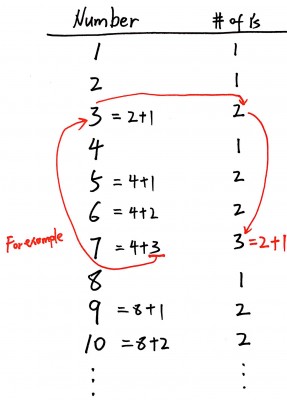Given a non negative integer number num. For every numbers i in the range 0 ≤ i ≤ num calculate the number of 1’s in their binary representation and return them as an array.
Example:
For num = 5 you should return [0,1,1,2,1,2].
1. Naive Solution
We can simply count bits for each number like the following:
public int[] countBits(int num) { int[] result = new int[num+1]; for(int i=0; i<=num; i++){ result[i] = countEach(i); } return result; } public int countEach(int num){ int result = 0; while(num!=0){ if(num%2==1){ result++; } num = num/2; } return result; } |
2. Improved Solution
For number 2(10), 4(100), 8(1000), 16(10000), …, the number of 1’s is 1. Any other number can be converted to be 2^m + x. For example, 9=8+1, 10=8+2. The number of 1’s for any other number is 1 + # of 1's in x.

public int[] countBits(int num) { int[] result = new int[num+1]; int p = 1; //p tracks the index for number x int pow = 1; for(int i=1; i<=num; i++){ if(i==pow){ result[i] = 1; pow <<= 1; p = 1; }else{ result[i] = result[p]+1; p++; } } return result; } |
This question can be solved using DP with Bitmasking.
The basic intuition behind bottom-up approach is that we are going to
directly access number of set bits in the number having value
current_number/2 and we are also going to check whether last bit is set
in this current_number or not by just doing and operation with 1.
current_number/2 or current_number>>1 basically removes the last bit of this
current_number so to include that bit in our count we have to manually
check the last bit of this number using & operation.
This would be expression for computing number of set bits in a number i
dp[i]=dp[i>>1]+(i&1)
If you still get stuck while solving this question then you can refer to the following video for better explanation.
Video Link: https://www.youtube.com/watch?v=xnmbO3lxhRM
class Solution {
public:
int dp[100000];
int bits(int n) {
if(n == 0 || n == 1) {
return n;
}
if(dp[n] != -1) {
return dp[n];
}
// closest 2^n
int k = 1;
while((k << 1) <= n) {
k = k << 1;
}
return dp[n] = 1+bits(n-k);
}
vector countBits(int num) {
vector res;
memset(dp, -1, sizeof(dp));
for(int i = 0; i <= num; i++) {
res.push_back(bits(i));
}
return res;
}
};
public int[] countBits(int num) {
int [] f = new int[num+1];
if (num == 0) {
return f;
}
f[1] = 1;
int lastPowerOfTwo = 0;
for (int i=2; i<f.length; i++) {
if ((i & (i-1)) == 0) { // power of 2
f[i] = 1;
lastPowerOfTwo = i;
} else {
f[i] = 1 + f[i-lastPowerOfTwo];
}
}
return f;
}